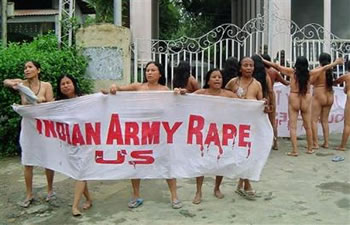IMPHAL (Manipur) - After torching government buildings and parading naked to protest the suspected custodial rape and killing of a woman by federal soldiers, women in Manipur vow to intensify their fight against frequent atrocities in the restive northeast Indian state.
An indefinite curfew is in force in Manipur, bordering Myanmar, to quell the uprising, with troops bursting teargas shells, water cannons and firing rubber bullets to disperse hundreds of women trying to break prohibitory orders.
At least 100 women were injured in police attacks since violence broke out Thursday, with some having to undergo surgeries to remove pellets embedded in their bodies.
The action follows violent protests by women in Manipur after the
bullet-riddled body of 32-year-old Thangjam Manorama was found on July 10.
Witnesses say Manorama was picked up by soldiers of the paramilitary Assam Rifles from her home on alleged charges of links with separatist rebels.
Hours later, her dead body was reportedly found four kilometers away from her home in the state capital Imphal, with multiple bullet wounds, besides torture signs.
Several women’s groups called a 48-hour general strike the day after
Manorama’s body was found, bringing normal life in the state to a grinding halt for two days until July 12.
On Thursday, hundreds of women had stormed the Assam Rifles headquarters in Imphal, with at least 40 parading naked and holding placards that read : "Indian Army rape us" and "Indian Army takes our flesh."
Authorities imposed an indefinite curfew fearing more protests. But women in hundreds started defying the curfew from Friday night by taking to the streets, prompting the police to resort to force to keep the protestors at bay.
On Sunday, protestors torched at least half-a-dozen government buildings, making authorities cut short a curfew relaxation.
"We want to punish the soldiers involved in the brutal killing of Manorama and so we are demanding handing over the errant soldiers to us," says Memchaoubi Devi, president of the women’s rights group Porei Lemarol Meira Phaibi Apunba Manipur.
She adds, "It is better to protest naked than allow the soldiers to kill and
rape our women."
A total of 32 women’s groups have come under one platform to protest the killing. Women in Manipur are known for taking up cudgels against social issues.
"This protest is not going to die down until and unless the guilty soldiers
are punished. Even if someone is involved in militancy, he or she should be brought to the court of law and not just killed or raped," lashes out Leirik Devi, president of the Kangla Mei, another powerful women rights group.
She vows, "We are prepared to shed blood but cannot allow the soldiers to outrage the modesty of our daughters. This protest will intensify."
Bowing to mounting pressure, the Assam Rifles Saturday removed an
unspecified number of soldiers from duty against whom there was a court of inquiry ordered to probe the alleged custodial death.
Assures Assam Rifles spokesman Major SD Goswami, "Anybody found guilty would be punished." The state government has also ordered a probe following rising pressure from women’s groups.
But women’s groups in the state have refused to call off their agitation even after the suspected soldiers were said to be taken off duty.
Says Leirik Devi, "Until and unless we get a concrete assurance from the
authorities that cases like rape or custodial killings will not recur, and stern action is taken against those errant soldiers, we are not going to stop our agitation."
"We cannot stop atrocities committed on the women by security forces unless we resort to radical forms of protest like stripping in public."
Manipur has witnessed an increase in excesses by armed forces on civilians and human rights violations in the name of curbing insurgency.
Charges rights campaigner T Singh, "The number of cases of rights violations, torture and rape by security forces has increased manifold. The Special Powers Armed Forces Act prevalent here gives security forces unlimited powers and impunity against rights violations."
"Our reports say there were at least 50 cases of third degree tortures on
innocent civilians accused of aiding militancy in the past one year. At least a dozen custodial deaths were reported in the same period, while a number of cases have gone unreported."
In October last year, 15-year-old Sanjita Devi committed suicide after being allegedly molested by army soldiers in Manipur. The army instituted a court of inquiry, but the findings were never made public.
Says another women’s leader, Sarojini Devi : "Such inquiries are nothing but a farce."
There are over 19 separatist groups active in Manipur, bordering Myanmar, with demands ranging from secession to greater autonomy and the right self-determination.
More than 10,000 people have lost their lives to insurgency in Manipur in the past two decades. Even the state government admits there were excesses committed by armed forces on the civilians.
Manipur Chief Minister Okram Ibobi Singh, who is the elected head of the state, in a letter to Indian Prime Minister Manmohan Singh asked the federal government to "restrain and do the needful to check the conduct of security personnel" deployed in the state.
But for now, Manipur is in turmoil with the women folk determined to
intensify their protests.
Published on Monday, July 19, 2004 by OneWorld.net
© Copyright 2004 OneWorld.net
On Sisyphe, July 24, 2004
 Imprimer ce texte Nous suivre
sur Twitter
Nous suivre sur Facebook Commenter cet article plus bas.
Imprimer ce texte Nous suivre
sur Twitter
Nous suivre sur Facebook Commenter cet article plus bas.

 Plan du site
Plan du site


 Imprimer ce texte
Imprimer ce texte 